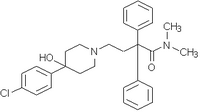Loperamide
Loperamide, usually as hydrochloride, is a drug effective against diarrhea resulting from gastroenteritis or inflammatory bowel disease. In most countries it is available generically under brand names such as Lopex®, Imodium®, Dimor® and Pepto® Diarrhea Control. more...
Mode of action
Loperamide is an opioid receptor agonist and acts on the mu opioid receptors in the myenteric plexus large intestines; it does not affect the central nervous system like other opioids.
It works by decreasing the activity of the myenteric plexus which decreases the motility of the circular and longitudinal smooth muscles of the intestinal wall. This increases the amount of time substances stay in the intestine, allowing for more water to be absorbed out of the fecal matter. Loperamide also decreases colonic mass movements and suppresses the gastrocolic reflex.
Loperamide does not cross the blood-brain barrier and has no analgesic properties or addictive potential. Tolerance in response to long-term use has not been reported.
Contraindications
Treatment should be avoided in the presence of fever or if the stool is bloody. Treatment is not recommended for patients who could suffer detrimental effects from rebound constipation. If there is a suspicion of diarrhea associated with organisms that can penetrate the intestinal walls, such as E. coli O157:H7 or salmonella, loperamide is contraindicated.
Side-effects
Side effects can include the following: drowsiness, constipation, abdominal pain or discomfort, dry mouth, fatigue, and in rare cases toxic megacolon.
Read more at Wikipedia.org



